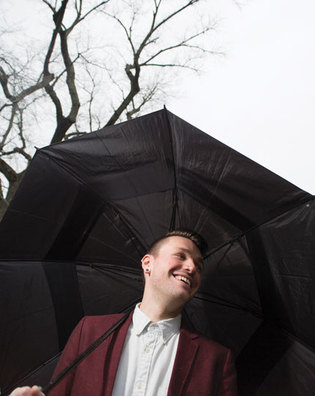True nonbeliever
With a charismatic young leader, Yale’s humanists are building a community that looks a little bit like church.

Chris Stedman, executive director of the Yale Humanist Community, found and lost religion before finding an ethical framework in humanism. (Mark Ostow)
By David Zax | Jul/Aug 2016
On Sunday, in a sunlit attic on Chapel Street, a group of 20 people are gathered in fellowship. Convened by a young man with religious training, the group has come together to socialize, share thoughts on what they believe, and listen to a sermon of sorts on how to improve the world. In many ways, it is like countless other services happening in churches around the city. But one thing sets apart these people, half of whom are Yale-affiliated: most of them don’t believe in God.
That is true, too, of their leader, the 29-year-old head of the Yale Humanist Community, Chris Stedman. Trained at a theological school in Chicago, he served as a “humanist chaplain” at Harvard for several years before moving to New Haven in 2014 to build a similarly secular community here. Today, listening to his invited speaker discourse on “The Nonreligious in American Politics,” Stedman looks nothing like the archetypal chaplain. (Indeed, he’s not officially a Yale chaplain; he calls himself the Yale Humanist Community’s executive director.) He wears skinny gray jeans cuffed above his mustard-yellow socks and green sneakers; tattoos peek from the sleeves of his slim blazer. Most chaplains you’ve known probably haven’t opted to pierce their noses and stretch their earlobes, as Stedman has.
A recent survey of American freshmen found that a quarter identified as nonreligious, up from 11 percent in 1973. A Pew survey in 2014 found that nearly as many Americans generally were religiously unaffiliated, with over 7 percent declaring themselves either atheist or agnostic.
What’s striking about the Yale Humanist Community, then, isn’t what it doesn’t believe in, but what it does. The most familiar brand of atheism is often hostile to religion—think Richard Dawkins’s book The God Delusion or the late Christopher Hitchens’s God Is Not Great: How Religion Poisons Everything. But an emerging kind of nonbeliever is less excited about insulting organized religion and more excited about borrowing parts of it: coping mechanisms, action plans for life, communities that help you adhere to the life you aspire to live. The Yale Humanist Community is built around this approach.
https://yalealumnimagazine.com/articles/4330-true-nonbeliever
